Hades

Dis, Pluton, Lord of the Dead. LN(E) greater power of death, riches of the earth, law, oaths (He/Him)
Pantheon: Greek
Symbol: A key, a black ram
Realm: Gray Waste / Pluton / the Underworld
Known Proxies: Rhadamanthys, Minos, and Aeacus (planar human proxy wizards [he/him] / LN)
Hades is the son of the titans Cronus and Rhea, and brother to Demeter, Hera, Hestia, Poseidon, and Zeus. He appears as a large, bearded man wearing black robes, often adorned with gold and silver jewellery.
When he and his brothers drew lots to divide the rule of the cosmos, Hades drew the Underworld for his domain. Thus he is the Lord of the Dead, whose souls pass from the Underlands into that cold, mouldering, and dingy place. Such is his mastery of the Underworld that it has taken on his name, and “taking the path to Hades” is a common euphemism for death itself.
Though mortals refer to the Underworld over which he rules supreme as “Hades”, few dare openly to utter the name with reference to the god himself. “King of those below”, “the chthonian god” or even “the other Zeus” reflect the fact that Hades is second in status to his brother, and his realm is a dark mirror to the majesty of Olympus.
Stern and implacable though he might be, Hades bears no ill-will to mortals. Generally, he views them with indifference, confident that the inevitability of their deaths will one day bring them to him in submission. Even the immortal elves know that, should their bodies be destroyed by violence or mischance, they will find themselves in the Halls of Waiting until such time that Hades judges them ready to return to the world above.
Hades jealously guards his rights over the souls of the dead or waiting: Very few have ever descended to the Underworld and been permitted to return intact. As such, though the undisputed god of the dead, Hades is incontrovertibly opposed to necromancy, resurrection, or any power which disputes his authority.
In addition to the Underworld, Hades also shares with his brothers the lordship over the soils of the Prime. The wealth hidden within the earth in particular is Hades’ province, from which his secondary name Pluton, or “Rich One”, is derived. Precious metals are his gifts to mortals during their brief lives. He is also a just power, and chant goes that even the gods themselves are bound by the oaths they swear to Hades’ servant river, the Styx. As such he is rarely hated by mortals, most of whom honour him in life as much as they fear him.
Unlike his brothers, Hades has few offspring. He abducted his wife, Persephone, as she was picking flowers and took her to the Underworld. Having discovered this, Persephone’s parents Zeus and Demeter commanded Hades to release her, which Hades only agreed to do so long as she had eaten no food while in his realm. When Persephone admitted that she had eaten four pomegranate seeds, an agreement was reached in which she would return to the earth, but be compelled to return to Hades each year for four months. During that time Demeter pines for her daughter, allowing crops to wither and leaves to fall, and so the rhythm of the seasons was established.
Despite its troubled beginning, the relationship between Hades and Persephone seems to be a strong and devoted one, with the latter taking naturally to her role as Queen of the Underworld. Together they lead the judges of the dead in determining the ultimate fate of the souls which enter their realm: Eternal punishment in Tartarus (Carceri), bliss in Elysium or, for the vast majority, oblivion and eventual rebirth in the Fields of Asphodel. Unlike his wife, Hades rarely leaves his realm, even when summoned to council with the other gods.
Clergy, Temples, and Worship
Hades rarely receives cult, has few festival days, and often seems indifferent to the offerings so central to the worship of his fellow gods. Festivals devoted to his wife Persephone are more numerous. Nevertheless, he has many priests who serve as guardians of the dead, of law, and of communal wealth. As such his temples across the planes, dark and forbidding places often containing elaborate catacombs and sunken vaults, often act as courthouses or treasuries. In cultures where burial of the dead is more common than cremation, they also commonly contain expansive tombs and graveyards within their boundaries.
Dark caves filled with noxious fumes may also be sacred to Hades, offering sites for ritual exploration by small bands of devoted and brave pilgrims.
Source: Aaron Masters and Jon Winter-Holt



